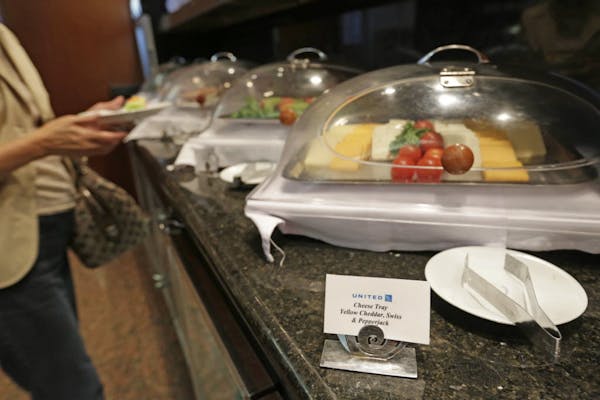NEW YORK – Airlines are introducing a new bevy of fees, but this time passengers might actually like them.
Unlike the first generation of charges that dinged fliers for once-free services like checking a bag, these new fees promise a taste of the good life, or at least a more-civil flight.
Extra legroom, early boarding and access to quiet lounges were just the beginning. Airlines are now renting Apple iPads preloaded with movies, selling hot first-class meals in coach and letting passengers pay to have an empty seat next to them. Once on the ground, they can skip baggage claim and have their luggage delivered directly to their home or office.
In the near future, airlines plan to go one step further, using massive amounts of personal data to customize new offers for each flier.
"We've moved from takeaways to enhancements," says John Thomas of L.E.K. Consulting. "It's all about personalizing the travel experience."
Carriers have struggled to raise airfares enough to cover costs. Fees bring in more than $15 billion a year and are the reason the airlines are profitable. But the amount of money coming in from older charges like baggage and reservation change fees has plateaued. So the airlines are selling new extras and copying marketing methods honed by retailers.
Technological upgrades allow airlines to sell products directly to passengers at booking, in follow-up e-mails as trips approach, at check-in and on mobile phones minutes before boarding. Delta Air Lines recently gave its flight attendants wireless devices, allowing them to sell passengers last-second upgrades to seats with more legroom.
And just like Amazon.com offers suggested readings based on each buyer's past purchases, airlines soon will be able to use past behavior to target fliers.
"We have massive amounts of data," says Delta CEO Richard Anderson. "We know who you are. We know what your history has been on the airline. We can customize our offerings."
Other airlines are experimenting with tracking passengers throughout the airport. In the future, if somebody clears security hours before their flight, they might be offered a discounted day pass to the airline's lounge on their phone.
Airlines have yet to find the right balance between being helpful and being creepy. So for now, most of the data is being used to win back passengers after their flight is delayed or luggage is lost.
"We want to get back to a point where people feel like travel isn't something to endure, but something they can enjoy," says Bob Kupbens, a former Target executive who is Delta's vice president of marketing and digital commerce.
Fees provide airlines with another advantage: The Internal Revenue Service has said they aren't directly related to transporting passengers, so they aren't subject to the 7.5 percent excise tax travelers pay on base fares. Taxing fees would give the government an extra $1.1 billion a year to fund the Federal Aviation Administration, runway upgrades and air traffic control improvements. Without the fees, experts say fares would be 15 percent higher.
In heated western Minn. GOP congressional primary, outsiders challenging incumbent

Minnesota Sports Hall of Fame: A class-by-class list of all members

This retired journalist changed professional wrestling from Mankato

